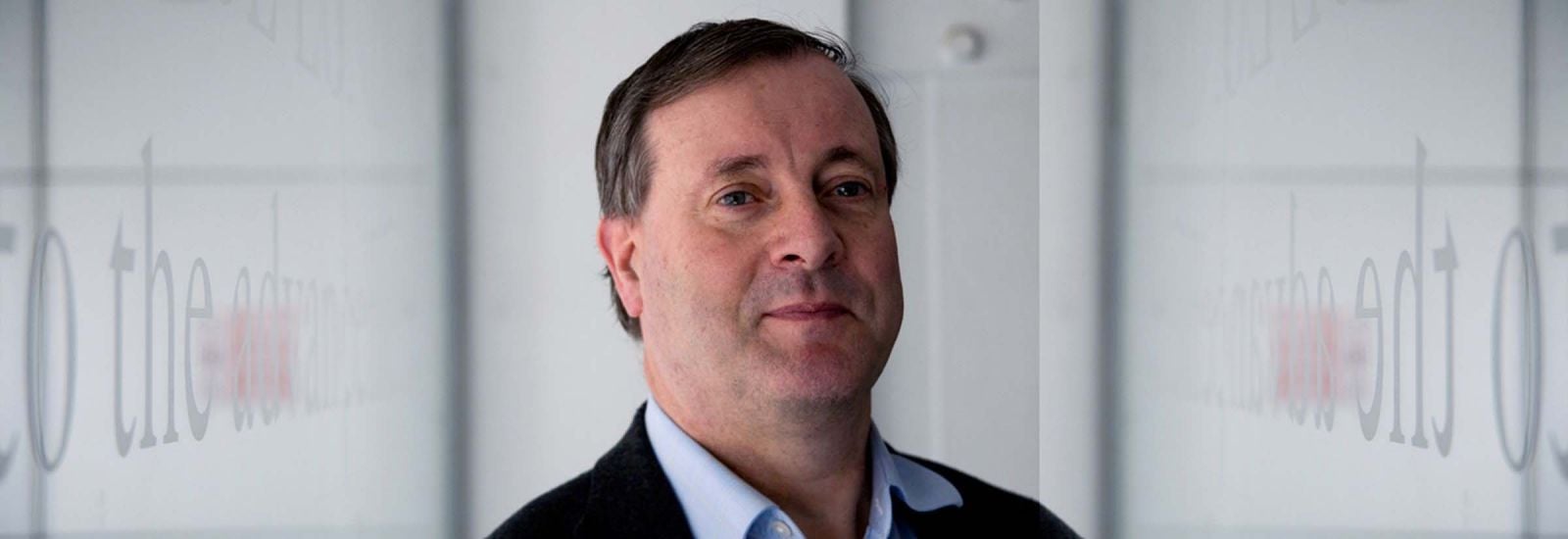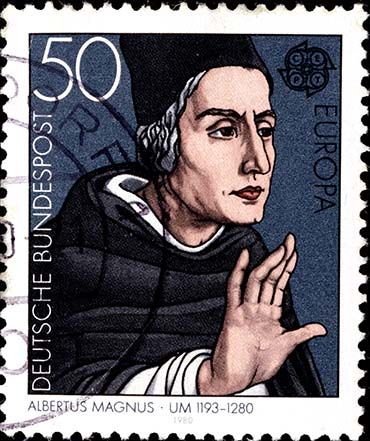
Religious people need to explain and debate better: Professor Alister McGrath on faith, CS Lewis and Christmas
CS Lewis, the renowned mid-20th century writer and Christian apologist, has much in common with Professor Alister McGrath. Both were born in Northern Ireland. Both became Oxford academics. Both were attached to the Church of England. But, perhaps, a more correct parallel for the Theology professor might be the 13th century German Dominican friar, Albert Magnus.
The German Dominican came from very a different religious and cultural tradition, but St Albert was famed in his own lifetime for his wide-ranging knowledge, which took in everything from astronomy to music and, of course, theology. Professor McGrath shares the friar’s interests in both Humanities and Sciences, as naturally linked areas of study - as they were for natural philosophers for hundreds of years.
 Some said Albert Magnus knew all there was to know. Credit: Shutterstock
Some said Albert Magnus knew all there was to know. Credit: ShutterstockToday, the word polymath is regularly used to mean someone who can answer random questions of general knowledge or who knows the location of Ulan Bator - rather than 'having learned much', its original meaning.
It was quite common, in earlier centuries, says Professor McGrath, for theologians to be interested in science and for mathematicians to explore theological questions. It is an interdisciplinary model he would very much like to see more in academia today and he talks with passion about the need to bring the humanities and natural sciences into conversation.
‘History shows a long and natural connection between them,’ he says. ‘In the heyday of natural philosophy at Oxford, it was seen as normal and intellectually productive to explore the relation of science and religion, or physics and philosophy.’
Professor McGrath has three doctorates to his name, in Divinity, science, and intellectual history. He has debated with the most famous scientist atheist of the day, the retired Professor Richard Dawkins. He wrote ‘The Dawkins Delusion’ in response to Dawkins’ ‘The God Delusion’. And, possibly because of his enthusiasm for popular debate, he is ranked – on the Academic Influence website – as the most influential theologian in the world since 2000, one place ahead of the former Archbishop of Canterbury Rowan Williams (himself a former Oxford theologian).
Professor McGrath has three doctorates to his name...He has debated with the most famous scientist atheist of the day, the retired Professor Richard Dawkins....[and] is ranked – on the Academic Influence website – as the most influential theologian in the world since 2000, one place ahead of the former Archbishop of Canterbury Rowan Williams
The Oxford intellectual community has been key to his work, says Professor McGrath, who has worked in the city for most of his academic career. He arrived 50 years ago, as an atheist undergraduate to study chemistry. He came to Oxford, he says, partly to escape the religious fervour of his homeland – then descending into decades of ‘troubles’ – but also because he found chemistry, ‘very very exciting’. It was not long, though, before the keen young student raised his head from his studies and began to want to explore broader questions.
‘There were bigger issues that I wanted to look at,’ he says. ‘But my advisors wanted me to get a doctorate first, before going on to study theology.’
The solution was simple, he says. He took his science doctorate and a theology BA at the same time, in three years. He was awarded both degrees in 1978, gaining the top first in the university for theology and a doctorate in molecular biophysics.
‘It was a very hectic time,’ he smiles.
 CS Lewis may be more famed for Narnia, but he was also a writer of popular Theology. Credit: Shutterstock.
CS Lewis may be more famed for Narnia, but he was also a writer of popular Theology. Credit: Shutterstock.Professor McGrath went on to become a minister in the Church of England and undertake further theology studies; so that today he is very much part of the Faculty of Theology and Religion, albeit as Andreos Idreos Professor of Science and Religion. But he insists, his ideas and he personally, owe a great deal to Oxford’s collegiate system, where academics from different disciplines are at close quarters, learning about each other’s subjects and ideas. He says, ‘Oxford has been a very important place for me....it has encouraged me to teach and write and has been very good to me.’
It’s so easy to underestimate the importance of how our university brings together people with different ideas...You can explore questions [at Oxford] which might not be possible elsewhere. It’s important to have a civilized debate about the big questions of life – such as whether there is a God, and the difference that this makes to life
Professor McGrath
Professor McGrath adds, ‘It’s so easy to underestimate the importance of how our university brings together people with different ideas.’
Although he talks about the need for ‘safe spaces’ at university, what Professor McGrath means is the ability to talk freely and safely with people of different views, rather than the ability not to encounter people with different views.
‘You can explore questions [at Oxford] which might not be possible elsewhere,’ he says. ‘It’s important to have a civilized debate about the big questions of life – such as whether there is a God, and the difference that this makes to life.’
Although he left his teenage atheism behind him, Professor McGrath has no animosity towards atheism. He says, ‘I can understand why someone might be an atheist, although I am not one myself any more.’
Indeed, one of his dialogue partners was the noted Marxist philosopher and historian of ideas Leszek Kołakowski. Professor McGrath recalls with particular pleasure an interdisciplinary conference he organised at Oxford to celebrate the late Dr Kołakowski’s 80th birthday.
Theology is not just an academic matter, it engages deep questions of meaning and value, Professor McGrath says. ‘With any big questions in life, you have to make judgements. We have to live with a degree of uncertainty about our deepest beliefs and convictions, especially when dealing with questions such as the meaning of life.’
But, he says, knowing about the science helps set the context for some of the more complex questions of life. Many people asked where God was in the midst of the 2004 Boxing Day tsunami, Professor McGrath says. ‘It helps to know that the tsunami was caused by shifting tectonic plates and that we need these shifting plates in order for life to emerge.’
Many ‘humanists’ reflect on why communities all over the world, from all different periods of history, end up believing in God. Are these random hangovers from our evolutionary past, or significant clues to who we really are?
Professor McGrath
He points out, Jack Straw, then Foreign Secretary, remarked, ‘we live in a fragile world. We have to learn to live with questions’.
But Professor McGrath suggests, many ‘humanists’ reflect on why communities all over the world, from all different periods of history, end up believing in God.
‘Are these random hangovers from our evolutionary past, or significant clues to who we really are?’ asks the professor. He adds, with a slightly despairing air, ‘Religious people need to do a better job in explaining and debating their ideas.’
Although Professor McGrath is ranked #1 as a global theological influencer, is he facing a losing battle? Are religious beliefs in decline? He points out, ‘In the past, people would have inherited religious ideas and learned how to reflect within that framework...but we have lost the intergenerational transmission of religious ideas.’
Religious people need to do a better job in explaining and debating their ideas...Are religious beliefs in decline? In the past, people would have inherited religious ideas...but we have lost the intergenerational transmission of religious ideas
Professor McGrath
It is a problem which, he believes, can be combatted with the sort of accessibility displayed by CS Lewis, who may be more famed for Narnia, but was also a writer of popular theology, ‘Professional theologians might not be very happy at the idea,’ says Professor McGrath, who clearly is. ‘But he was able to explain religious ideas clearly and using elegant English to help people outside the field to understand them.’
He continues, ‘Lewis is a gateway to serious academic study of theology...it draws people into the field...you need people such as Lewis. It is important for Oxford to have that link.’
Professor McGrath maintains interdisciplinarity is one of Oxford’s greatest strengths. It allows respectful and critical conversations across disciplinary boundaries. He sees this as a hallmark of what used to be known as ‘natural philosophy,’ especially in the forms this took at Oxford in the 17th century. Early modern scientists, such as Robert Boyle, saw themselves as working at the interface of what we would now see as philosophy, science, and theology. Professor McGrath observes, ‘Boyle wanted to learn about nature, and to learn from nature.’
He saw himself as a priest in the temple of nature, wanting to understand and respect the natural world, explains Professor McGrath, adding with concern, ‘We’ve lost something and it affects the way we have looked at nature and the respect we have for the natural world.’
Professor McGrath maintains interdisciplinarity is one of Oxford’s greatest strengths; it allows respectful and critical conversations across disciplinary boundaries. He sees this as a hallmark of what used to be known as ‘natural philosophy’
‘You need to be able to see the big picture,’ he emphasises. ‘There needs to be a deeper vision of being human in the natural world. The real problem is that past generations wanted to control nature and so were simply exploiting the world.’
Whatever the Dickensian narrative, Christmas was, for many years, seen as semi-superstitious by many UK churchmen. But Professor McGrath does not want to ban feasts, as in the days of Cromwell’s Commonwealth. With Christmas approaching, however, he is clearly intending to use the time profitably, ‘Feasts give us a chance to slow down and think, to reflect on deeper things.’
People are looking for something that really satisfies their deepest longings. But we have to learn to live with uncertainty about the answers we give to life’s deepest questions. The certainty of political and religious dogmatism makes me uneasy
Professor McGrath
As a Christian theologian, Professor McGrath says he sees Christmas as marking a transformation of understanding who we are, and why we matter.
He is optimistic about the future. ‘People are looking for something that really satisfies their deepest longings. But we have to learn to live with uncertainty about the answers we give to life’s deepest questions. The certainty of political and religious dogmatism makes me uneasy.’
As he heads towards retirement at the end of this academic year, Professor McGrath is evidently not intending to slow down and is very far from his last battle.
By Sarah Whitebloom